This summary text is fully AI-generated and may therefore contain errors or be incomplete.
Introduction
US stock futures tumbled sharply following the inconclusive Trump-Xi summit in Busan, with the Dow Jones dropping 200 points as markets reacted to limited progress on trade negotiations between the world’s two largest economies. The disappointing outcome sent ripples across financial markets, with major indices declining and investor confidence shaken by the lack of substantive trade agreements between the United States and China.
Key Points
- Trump-Xi meeting resulted in limited trade concessions including US Fentanyl tariff reduction and Chinese rare earth export commitments
- Major tech stocks faced pressure with Meta dropping 8% premarket and Apple/Amazon earnings looming
- Cryptocurrency markets also weakened as Bitcoin fell below $108,000 amid broader market uncertainty
Market Reaction to Limited Trade Progress
The highly anticipated 90-minute summit between former President Donald Trump and Chinese leader Xi Jinping concluded without the breakthrough that investors had hoped for, triggering immediate selling pressure across US equity markets. The Dow Jones Industrial Average fell 200 points in futures trading, while the S&P 500 slipped 16 points and the Nasdaq Composite declined 60 points. The modest concessions announced—including the US halving Fentanyl tariffs to 10% and China’s pledge to continue rare earth exports while resuming soybean and energy purchases—failed to address the core trade tensions that have weighed on markets for years.
Market participants had been hoping for more substantial progress in resolving the longstanding trade disputes between the United States and China, particularly around technology transfers, intellectual property protections, and broader tariff reductions. The limited scope of the agreements reached in Busan suggests that the fundamental economic competition between the world’s two largest economies remains largely unresolved, creating continued uncertainty for global supply chains and corporate earnings outlooks.
Tech Sector Under Pressure Ahead of Key Earnings
Adding to the market’s negative sentiment, Meta Platforms saw its shares drop 8% in premarket trading, contributing significantly to the Nasdaq’s decline. The social media giant’s weakness came amid broader concerns about technology sector performance and regulatory challenges. Meanwhile, investors are bracing for earnings reports from Apple and Amazon, two bellwether companies whose results could either exacerbate or alleviate the current market anxiety.
The timing of these key earnings releases compounds the market’s sensitivity to the Trump-Xi summit outcome. Apple’s extensive manufacturing presence in China and Amazon’s global supply chain operations make both companies particularly vulnerable to ongoing trade tensions between the United States and China. Market analysts will be closely watching for any guidance from these tech giants regarding how the limited trade progress might affect their future operations and profitability.
Cryptocurrency and Broader Market Implications
The risk-off sentiment extended beyond traditional equity markets, with Bitcoin sliding below $108,000 as investors sought safer assets. The cryptocurrency’s decline reflects broader market uncertainty and suggests that digital assets remain correlated with traditional risk appetite during periods of geopolitical tension. The simultaneous weakness in both traditional and cryptocurrency markets underscores the comprehensive nature of the negative reaction to the summit’s limited outcomes.
The market’s response highlights ongoing concerns about the durability of the economic relationship between the United States and China. While the resumption of soybean and energy purchases provides some relief to specific agricultural and energy sectors, the broader trade framework remains fragile. The commitment to continue rare earth exports offers temporary stability for technology and defense industries dependent on these critical materials, but fails to address long-term supply chain security concerns that have driven recent industrial policy initiatives in both countries.
📎 Read the original article on indiatimes.com

